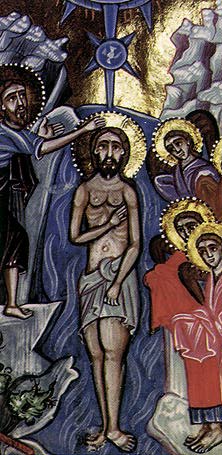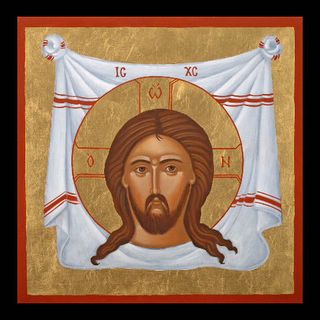Theophany: Rev. 22 and Cosmic Liturgy
Revelation 22.1-4:
Then he showed me the river of the water of life, bright as crystal, flowing from the throne of God and of the Lamb through the middle of the street of the city; also, on either side of the river, the tree of life with its twelve kinds of fruit, yielding its fruit each month; and the leaves of the tree were for the healing of the nations. There shall no more be anything accursed, but the throne of God and of the Lamb shall be in it, and his servants shall worship him; they shall see his face, and his name shall be on their foreheads.

Theophany Theology: A Cosmos Revealed
15 hymns on the Epiphany
See also St. Ephrem Library
…In the liturgical prefigurement of the Kingdom of Heaven, the world of humankind and angels, of materiality, corporality, history and inspired human achievement are drawn up into the service of God. Salvation embraces not only the individual person, but all that God has made. In its cosmic dimensions, the liturgy gathers up every feature of creation into itself.
…
Liturgical cosmology has had its most consistent historical expression in eastern Christianity — much more so than in the west. The ancient sense of creation as a participant in a cosmic liturgy is well summarized by Orthodox theologian Paul Evdokimov when he states: "Everything is destined for a liturgical fulfillment."
In the "sacramental cosmology" of early Christianity, he writes, "Everything is referred to the Incarnation and everything finds its final goal and destiny in the Lord." Accordingly, "Cosmic matter thus becomes a conductor of grace, a vehicle of the divine energies."
Evdokimov continues: "The rhythms of nature, the flesh of this world, having been enrolled in the sacramental and liturgical action, integrate themselves into sacred history. The sacred space of the Church penetrates cosmic space," and the Christian liturgy "undertakes the consecration of the whole world."
Here the liturgy is not thought of simply as "a copy of the heavenly liturgy but is rather the eruption of the heavenly into history: God descends and sanctifies not only souls but the whole of nature and cosmic spaces."
In the same way, "the Church’s calendar and the cycle of offerings sanctify and fill with meaning the elements of time and the march of history" (The Art of the Icon: A Theology of Beauty [Redondo Beach, CA: Oakwood Publications, 1990], 117 ff.).
In this vision of things, the eucharist prefigures the ultimate consecration of all food; baptism is the anticipated consecration of all water. At the heart of this cosmology lay from early times an impressive "cosmic Christology."
Christ is not only the shepherd of souls but the first fruits of creation, the center of the cosmos, the one through whom all things were made and in whom all will be recapitulated and redeemed.
…
Christian believers bring not simply their individual selves to the liturgy; they bring the whole cosmos. Or put another way, the liturgy brings the divine cosmos to every worshipping assembly.
…
If the end of history is the cosmos become a liturgy, then the church’s liturgy in a new millennium must be, evidently and convincingly, a cosmic liturgy.
Angels and Archangels: The Worship of Heaven and Earth
Does it make any difference how we worship if we offer our sacrifice "with angels and archangels"?
by Robert Louis Wilken.
The Eighth Day in Liturgy: Epiclesis and "Maranatha" in the Early Church.
The Eighth Day: the Peace of the New Jerusalem

The Mandylion
Icon of the Face Not Made by Human Hands
written by KhouriaHeather
-- a Gift of the Holy Face given on the Holy Napkin to Abgar, King of Edessa. According to Eusebius and other sources King Abgar corresponded with the Lord, inviting Him to live in Edessa. Although the Lord declined, he sent a towel impressed with His likeness, the original Made-Without-Hands Ikon (Mandylion). Later St. Thaddeus of the Seventy or another apostle is said to have brought the Gospel in full to Abgar's kingdom.Acts of the Apostles,19.11-12:
Now God worked unusual miracles by the hands of Paul, so that even handkerchiefs or aprons were brought from his body to the sick, and the diseases left them and the evil spirits went out of them.

Then he showed me the river of the water of life, bright as crystal, flowing from the throne of God and of the Lamb through the middle of the street of the city; also, on either side of the river, the tree of life with its twelve kinds of fruit, yielding its fruit each month; and the leaves of the tree were for the healing of the nations. There shall no more be anything accursed, but the throne of God and of the Lamb shall be in it, and his servants shall worship him; they shall see his face, and his name shall be on their foreheads.
Maranatha!
Rev 22:16-17
I, Jesus, have sent My angel to testify to you these things for the churches.
I am the root and the descendant of David, the bright morning star.
The Spirit and the bride say, "Come."
And let the one who hears say, "Come."
Let the one who thirsts come forward,
and the one who wants it freely receive the gift of life-giving water.
Coptic Icon of Theophany
The Blessing of the Waters in Theophany
reveals the sacramental cosmology of the New Aeon: A patristic light upon this cosmology is Hymn 8 on the Epiphany, by St. Ephrem. In the waters of Genesis Ephrem beholds a kind of prime matter of the cosmos; in the waters of the Jordan Ephrem witnesses a New Creation in Christ.
St. Ephrem's Hymn 14
on the Epiphany:
19. "Small is the river whereto You have come,
—that You should lodge therein and it should cleanse You.
—The heavens suffice not for Your mightiness;
—how much less shall Baptism contain You!"
20. "The womb is smaller than Jordan;
—yet was I willing to lodge in the Virgin:
—and as I was born from woman,
—so too am I to be baptized in Jordan."
21. "Lo! the hosts are standing!
—the ranks of Watchers, lo! they worship!
—And if I draw near, my Lord, to baptize You,
—I tremble for myself with quaking."
22. "The hosts and multitudes call you happy,
—all of them, for that you baptize Me.
—For this I have chosen you from the womb:
—fear not, for I have willed it.
The New Millenium, Anno Domini:
Theophany as a sacramental Mystery of the Apokatastasis:
Christian believers bring not simply their individual selves to the liturgy; they bring the whole cosmos. Or put another way, the liturgy brings the divine cosmos to every worshipping assembly.
Bringing the Cosmos to the Liturgy
Rev. M. Francis Mannion,
excerpt from Antiphon Vol 6 no 1, 2001
The cosmic element of Christianity was fundamental to the consciousness of the early church.excerpt from Antiphon Vol 6 no 1, 2001
…In the liturgical prefigurement of the Kingdom of Heaven, the world of humankind and angels, of materiality, corporality, history and inspired human achievement are drawn up into the service of God. Salvation embraces not only the individual person, but all that God has made. In its cosmic dimensions, the liturgy gathers up every feature of creation into itself.
…
Liturgical cosmology has had its most consistent historical expression in eastern Christianity — much more so than in the west. The ancient sense of creation as a participant in a cosmic liturgy is well summarized by Orthodox theologian Paul Evdokimov when he states: "Everything is destined for a liturgical fulfillment."
In the "sacramental cosmology" of early Christianity, he writes, "Everything is referred to the Incarnation and everything finds its final goal and destiny in the Lord." Accordingly, "Cosmic matter thus becomes a conductor of grace, a vehicle of the divine energies."
Evdokimov continues: "The rhythms of nature, the flesh of this world, having been enrolled in the sacramental and liturgical action, integrate themselves into sacred history. The sacred space of the Church penetrates cosmic space," and the Christian liturgy "undertakes the consecration of the whole world."
Here the liturgy is not thought of simply as "a copy of the heavenly liturgy but is rather the eruption of the heavenly into history: God descends and sanctifies not only souls but the whole of nature and cosmic spaces."
In the same way, "the Church’s calendar and the cycle of offerings sanctify and fill with meaning the elements of time and the march of history" (The Art of the Icon: A Theology of Beauty [Redondo Beach, CA: Oakwood Publications, 1990], 117 ff.).
In this vision of things, the eucharist prefigures the ultimate consecration of all food; baptism is the anticipated consecration of all water. At the heart of this cosmology lay from early times an impressive "cosmic Christology."
Christ is not only the shepherd of souls but the first fruits of creation, the center of the cosmos, the one through whom all things were made and in whom all will be recapitulated and redeemed.
…
Christian believers bring not simply their individual selves to the liturgy; they bring the whole cosmos. Or put another way, the liturgy brings the divine cosmos to every worshipping assembly.
…
If the end of history is the cosmos become a liturgy, then the church’s liturgy in a new millennium must be, evidently and convincingly, a cosmic liturgy.
by Robert Louis Wilken.
Theophany as a mystical Parousia
in the Scripture and Liturgy of the Church:
in the Scripture and Liturgy of the Church:
Hebrews 9.24: Christ has entered, not into a sanctuary made with hands, a copy of the true one, but into heaven itself, now to appear in the presence of God on our behalf.

The Mandylion
Icon of the Face Not Made by Human Hands
written by KhouriaHeather
-- a Gift of the Holy Face given on the Holy Napkin to Abgar, King of Edessa. According to Eusebius and other sources King Abgar corresponded with the Lord, inviting Him to live in Edessa. Although the Lord declined, he sent a towel impressed with His likeness, the original Made-Without-Hands Ikon (Mandylion). Later St. Thaddeus of the Seventy or another apostle is said to have brought the Gospel in full to Abgar's kingdom.Acts of the Apostles,19.11-12:
Now God worked unusual miracles by the hands of Paul, so that even handkerchiefs or aprons were brought from his body to the sick, and the diseases left them and the evil spirits went out of them.

<< Home